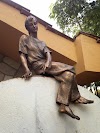Last week I stopped for a day in Johannesburg to join the "training of trainers" gathering from the anglophone countries in our continent. SECAM (the Symposium of Episcopal Conferences of Africa and Madagascar) had organised a workshop to present new material prepared at continental level.
"After a deep reflection on the Church in Africa, the Fathers of the Second Special Session for Africa of the Synod of Bishops, held in October 2009, recommended 'that SECAM develop an HIV/AIDS pastoral manual for all those involved in the Church's AIDS ministry (priests, religious, doctors, nurses, counsellors, catechists, teachers) applying the Church's moral and social doctrine in the different situations, where the People of God in Africa are facing the various challenges of the pandemic'.
This Pastoral Training Manual represents the efforts of the Church in Africa to fulfil the above recommendation"
I could not join them for the whole workshop. I just wanted to greet them being myself the liaison bishop for the Aids Office of the Southern African Catholic Bishops' Conference (SACBC).
By the time I arrived three people living in South Africa were presenting their story. I practically missed the first one. The second one asked to address us sitting down. She was using crutches. This is more or less what she said:
"My first child was epileptic. When in 1996 I became pregnant with my second child I discovered I was HIV positive. My child was also born HIV positive. I never told my husband. I did not know how he would react. I tested my child two more times and the result was always positive.
After three years I took courage and told my husband but first I gathered all my belongings in case he would tell me to leave our home.
I woke him up very early. It was about 4 am and told him I had to tell him something important. He did not react. He did not say anything. I think he never accepted that we were positive. He died some years' later.
I was then discovered with cancer. I kept on wondering what was going to happen with my children. How they would face their lives without me. People can be very hard with their comments.
You see I use crutches. I was involved in a car accident in 2010 and I have had three operations on my leg. I should have another one but I am not sure I can take it.
Cancer has reached level three. It is spreading.
My home is a pharmacy. In the morning we come together and we make sure that the three of us take our medication.
My second born is now 18 years' old and she is writing matric. I am proud of her."There was a deep silence in the room. We were all listening attentively.
Later in the evening we were asked to share what feelings we experienced as they shared their stories with us, what thoughts came to our minds and what actions we felt like taking.
Hope you can read what was written on the board but together with that came, once again, a deep need to be able to listen. Her story is not the only one and many times we do not know them because there are no spaces for them to share their stories.
Listening to her reminded me of many similar stories I came across while in Pongola, Madadeni and Daveyton in the last 20 years.
HIV/Aids have been with us for decades. Maybe it is no longer an emergency as it was before. Maybe it is no longer a death sentence. Still, the need to create spaces for listening to those infected and affected has certainly not changed.





